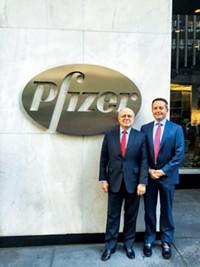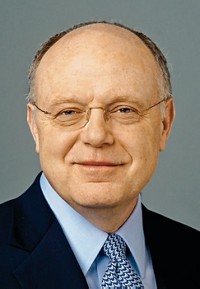Advertisement
Grab your lab coat. Let's get started
Welcome!
Welcome!
Create an account below to get 6 C&EN articles per month, receive newsletters and more - all free.
It seems this is your first time logging in online. Please enter the following information to continue.
As an ACS member you automatically get access to this site. All we need is few more details to create your reading experience.
Not you? Sign in with a different account.
Not you? Sign in with a different account.
ERROR 1
ERROR 1
ERROR 2
ERROR 2
ERROR 2
ERROR 2
ERROR 2
Password and Confirm password must match.
If you have an ACS member number, please enter it here so we can link this account to your membership. (optional)
ERROR 2
ACS values your privacy. By submitting your information, you are gaining access to C&EN and subscribing to our weekly newsletter. We use the information you provide to make your reading experience better, and we will never sell your data to third party members.
Business
Pfizer Drops Pursuit Of AstraZeneca
Two drug majors to go separate ways after failed takeover attempt
by Ann M. Thayer
May 30, 2014
| A version of this story appeared in
Volume 92, Issue 22
Pfizer ended its attempt to take over AstraZeneca last week after the British firm rejected its final $119 billion offer. “We continue to believe that our final proposal was compelling and represented full value,” Pfizer CEO Ian C. Read said.
In turning down the U.S. company’s bid, AstraZeneca Chairman Leif Johansson declined to heed some shareholders who wanted him to at least engage in talks. Rather, Johansson said he preferred to take “the opportunity to continue building on the momentum we have already demonstrated as an independent company.”
Pfizer is now bound by U.K. takeover code, which prevents it from making an offer for three months, according to ISI Group analyst Mark Schoenebaum, who has been following the saga. Any offer within six months would require consent from AstraZeneca or an exception from the takeover board, Schoenebaum says.
The two big pharma companies now separately face the task of turning around their lackluster financial performance of recent quarters. For its part, AstraZeneca anticipates positive drug development news in the coming months.
Meanwhile, rather than pursuing another megamerger, Pfizer is apt to “focus on bolt-on acquisitions in areas where AstraZeneca would have given them some added strength,” Credit Suisse analyst Vamil Divan said in a recent report. Such areas include immuno-oncology, inflammation, and emerging markets, he added.
Pfizer recently reiterated that its long-term strategy, with or without the AstraZeneca deal, is to split into three parts: innovative pharmaceuticals; generic drugs; and vaccines, oncology, and consumer health.




Join the conversation
Contact the reporter
Submit a Letter to the Editor for publication
Engage with us on Twitter